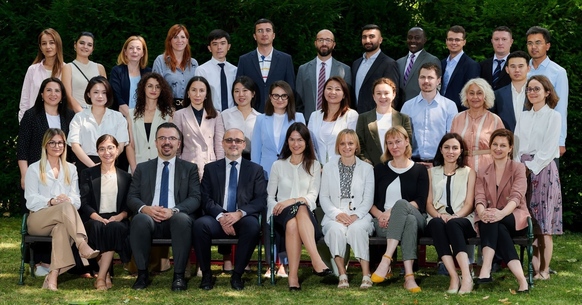- English | Русский

Following three years of virtual delivery, the JVI/Deutsche Bundesbank (DBB) course on Monetary Policy Communication was delivered in-person during July 24-28 in Vienna. The course was attended by 29 participants from 19 countries, almost all of them central bank employees.
The course had two interwoven streams of lectures and workshops. The first stream focused on central bank (CB)/monetary policy (MP) communication. More specifically, the lectures and workshops dealt with general and technical aspects of MP communication, including communication strategies and skills required for identifying target groups, as well as hands-on workshops on communication tools. The second stream focused on CB transparency and economic aspects of MP communication in a forward-looking environment, as well as communication challenges related to foreign exchange interventions.
Case studies, describing the experience of the Oesterreichische Nationalbank (OeNB) with enhancing financial literacy of the public and that of the Czech National Bank with designing internal and external MP communication strategies, provided insight into these institutions’ applied policies. Mr. Gabriel Glöckler, currently Senior Manager at the Directorate General Communications of the European Central Bank (ECB), provided a lively, candid presentation focusing on the main pillars of the ECB’s communication policy, including current communication challenges. Another case study was delivered by Ms. Joanna Niedźwiedzińska from the National Bank of Poland (NBP), who shed light on the NBP’s communication strategy, providing a perspective from outside of the Eurozone.
Finally, Ms. Klodiana Istrefi from the ECB delivered a guest lecture on recent findings of monetary policy communication research. She focused on the communication of the ECB and its impact on financial markets as well as the Fed’s communication on financial stability concerns and MP decisions.
The course was very well received by participants. Combining central bank communication, aimed at PR/communication experts, with monetary policy-oriented training, aimed at staff of Economics Departments involved in monetary policy communication, is one of the key features of the course. Such blending of economic and public relation aspects of MP communication is effective in broadening both groups’ perspectives and facilitating their more effective cooperation in the future. Indeed, the skills and knowledge gained during the course were viewed by participants as helpful for their job and professional development.
Tibor Hlédik, Lead Economist, JVI